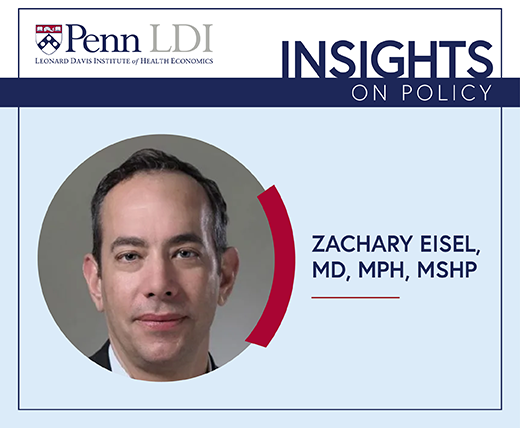
Over 500 U.S. Hospitals Have Stopped Delivering Babies Since 2010
A Crisis in Maternal Care is Unfolding—and it’s Hitting Rural and Urban Communities Alike
Health Equity | Improving Care for Older Adults
News

The University of Pennsylvania’s Center for Improving Care Delivery for the Aging (CICADA) has announced three new postdoctoral and junior faculty to become the program’s fourth cohort of CICADA Scholars pursuing pilot research and receiving training and mentorship in health services research.
Established on the Penn campus three years ago, CICADA is funded through a five-year grant from the National Institute on Aging (NIA) as a new Resource Center for Minority Aging Research (RCMAR).
CICADA is a multidisciplinary research initiative aimed at improving the diversity of the health services research (HSR) workforce studying aging and health care issues.
The three new grantees for the 2021-2022 CICADA cohort are:
Lan Đoàn, PhD, MPH, a Postdoctoral Fellow in the Department of Population Health, Section for Health Equity, in the Center for the Study of Asian American Health at New York University. Her CICADA pilot project is titled “Addressing Missing Racial/Ethnic Data in Electronic Health Records for Health Equity Research.”
Courtney Lee, MD, MPH, a Penn LDI Associate Fellow and internist at Penn Presbyterian Medical Center and General Internal Medicine Fellow at the University of Pennsylvania. Her CICADA pilot project is “Impact of the Caregiver Advice, Record, Enable (CARE) Act on Patient Experience and Readmissions at US Hospitals.”
Rose Onyeali, MD, a Penn LDI Associate Fellow, an attending hospitalist at Pennsylvania Hospital, and a recent graduate of the Geriatrics Fellowship at Penn. Her research interest focuses on incarcerated adults with cognitive and functional impairments and her CICADA pilot project is “Improving Transitions of Care for Incarcerated Older Adults.”
“This last year with the COVID-19 pandemic demonstrated once again the profound inequities in health care in the U.S. It underscores the critical importance of research focused on addressing these inequities and having a diverse and talented workforce to do this work,” said CICADA Co-Director Rachel Werner, MD, PhD.
“The ongoing level of interest and quality of candidates in this program are further indications of its importance,” said CICADA Co-Director Allison Willis, MD, MS. “They indicate the crucial need to broaden expertise in minority health research as we address equity issues made even clearer by the pandemic.” Werner is Executive Director of LDI and a Professor at both the Wharton School and the Perelman School of Medicine; Willis is an Associate Professor at the Perelman School of Medicine.
Launched in 1997 with centers at a handful of universities, the NIA’s national RCMAR program has 18 research and training facilities across the country. Each center focuses on a different aspect of aging and health care. Penn’s is one of a few that focus on the discipline of health services research, the study of how health care delivery is organized, financed, managed, quality-controlled, and regulated.
The essential goal of RCMAR is to recruit, mentor, and develop minority junior faculty members into accomplished research scientists, a process that begins with pilot research projects they undertake with their mentors. Since its founding 24 years ago, more than 400 research scholars have come through the RCMAR program, most going on to academic research careers.
The broad RCMAR programs are informed by the fact that underrepresented researchers bring essential diverse perspectives and, often, personal experiences to bear in understanding the social, economic, political, and environmental determinants of racial and ethnic disparities in health and health care. According to the federal Office of Minority Health, underrepresentation in research leads to underfunding of health research as well as a lack of culturally appropriate theories, models, and methodologies.
The CICADA program is facilitated through Penn LDI and links to all of Penn’s 12 schools. CICADA mentors are drawn from across the University, creating an interdisciplinary approach to training.

A Crisis in Maternal Care is Unfolding—and it’s Hitting Rural and Urban Communities Alike

Stable Payments Improved Margins But Not Liquidity, New LDI Analysis Finds

LDI Senior Fellow Cited for “Significant Contributions” in Research

Outdated Laws Target Black and Queer Lives in Over 30 States, Fueling a Deadly Disease

Selected for Current and Future Research in the Science of Amputee Care

Research Memo: Delivered to House Speaker Mike Johnson and Majority Leader John Thune